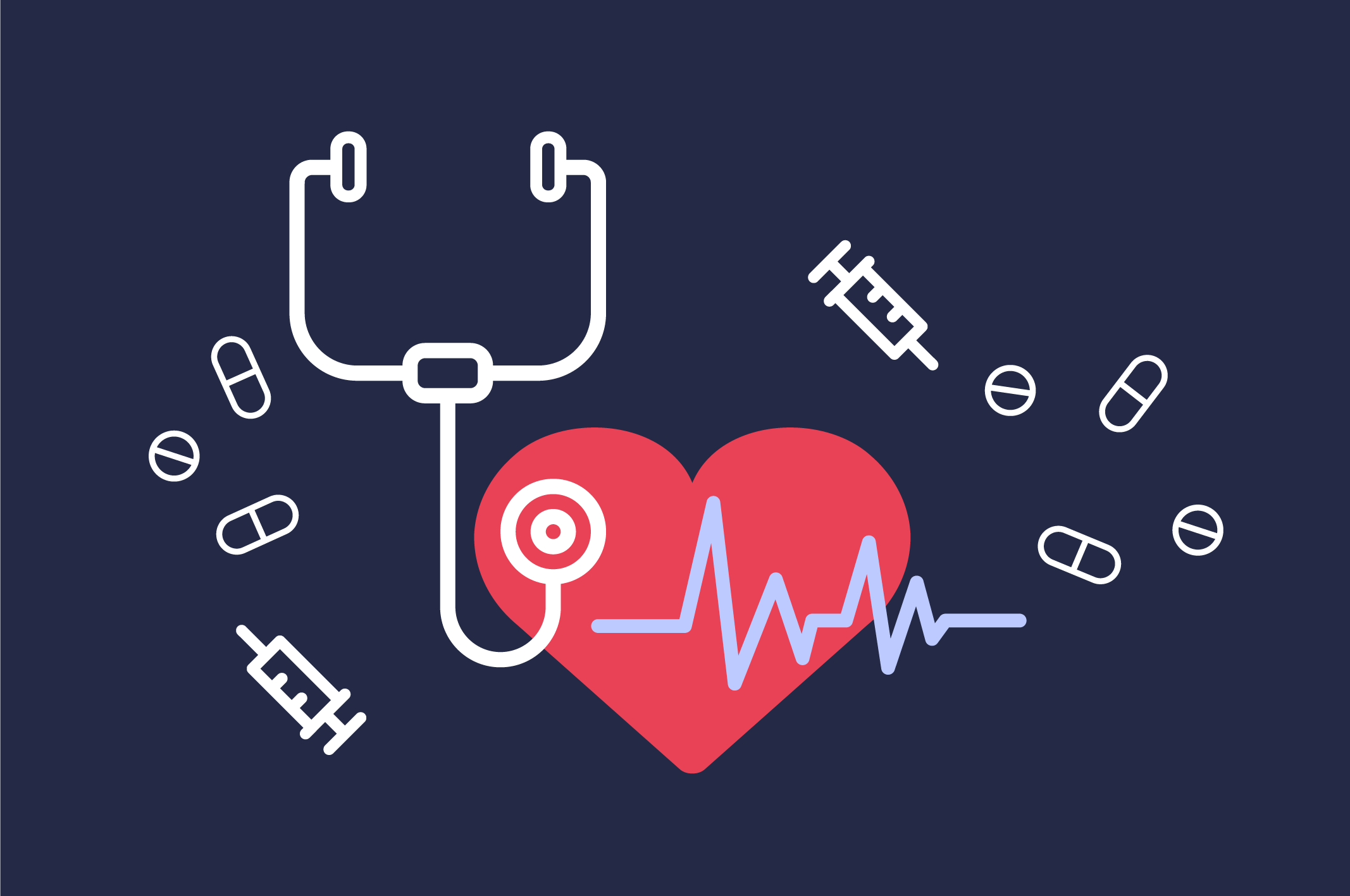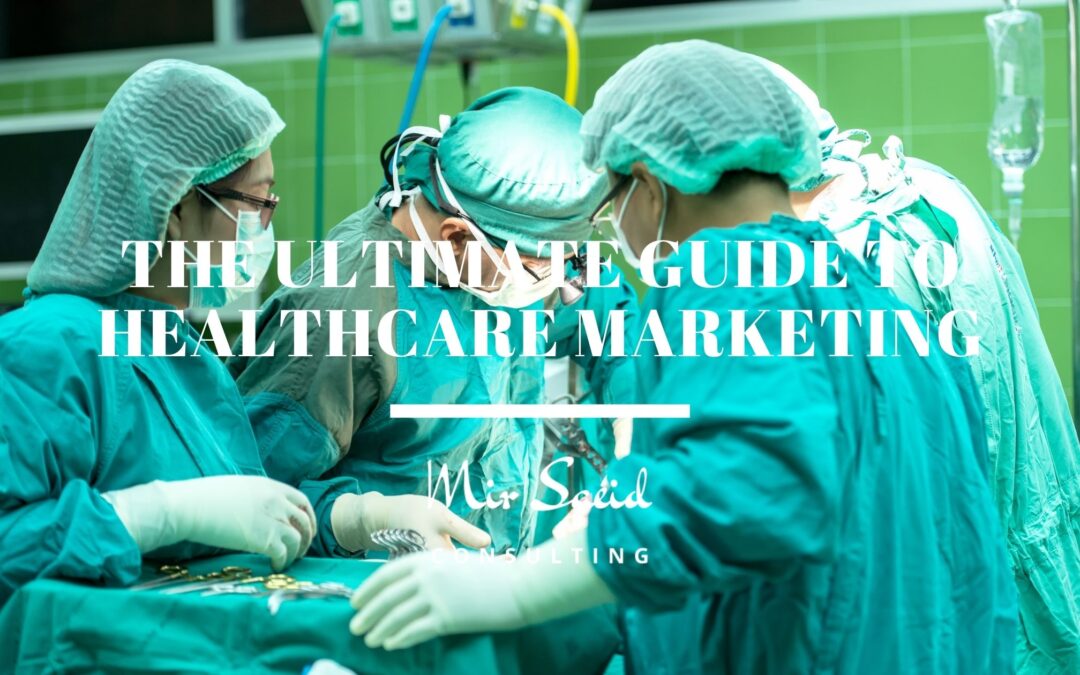Healthcare and hospitality are booming sectors that are going to grow even more in the near future. In the USA, healthcare makes for more than 18% of the GDP, as is the case with most developed countries.
A lot of sub-industries fall under healthcare which includes hospitals, clinics, pharmaceuticals, medical devices, mental health, etc. And there is a specific way to market each one of them.
But in general, most of them will follow the same style.
What is Healthcare Marketing?
The process of healthcare marketing involves reaching out to healthcare consumers through strategized communication, guiding them throughout their healthcare journey, and keeping them engaged with the health system. This is the top-level approach to marketing any healthcare service.
Some complex healthcare marketing strategies include omnichannel, segmented, offline, and online targeted strategies to accelerate growth and engagement. Just as other businesses do for their marketing, even the health system measures its growth through factors like KPIs, and/or marketing ROI (Return on Investment.)
Hire a Digital Marketing Consultant

What are the benefits of Healthcare Marketing?
The general benefits of any marketing strategy are the growth of a business. Whether the healthcare is an established enterprise or just a recently launched company, they all need a form of promotion. Startup Marketing or Enterprise Marketing, both have the same end goal, more profits and reach.
Going to the specific benefits of Healthcare Marketing:
- helps to find potential health consumers who are business minded
- increase patient input in a highly-competitive landscape
- keeps patients engaged with personalised, and timely outreach
- improve loyalty in healthcare community by retaining patients for long-term
- create qualified leads that generate revenue with good margins
- establish connection with patients through multiple channels
- use healthcare data analytics to determine proper strategies and evaluate productivity
Strategies for Healthcare Marketing
Healthcare is a constantly evolving sector that can prove challenging even to the best expert marketers out there. So, when you are hiring a Content Marketing Consultant, make sure to choose the best available to you.
Marketing teams need to be equipped with the latest industry updates and trends to determine the right strategies that prove overall effective and maximize impact on the health system.
1. Create a Seamless System
A rewarding healthcare marketing strategy would keep patients over the top. Their experience matters the most especially when it comes to creating a connection with them. You need to ensure that they can connect with you through their preferred channels and have a great experience while doing so.
The first step would require you to find out which is the channel the patients use first to engage with your health system. These channels are collectively known as the digital front door and include your health system’s website, your engagement center, etc. You can hire a social media expert to take care of your social media, and truly make
After the first engagement with your health care system, the path that the patient chooses is your first step, to begin with. This practice is also known as patient journey mapping and will help you to know which action will lead to a conversion and which actions will lead the patients to exit or discontinue the connection.
You will have to map patient journeys across service lines, how they work with clinicians, revenue cycle specialists, and other patient-facing staff services to capture the best understanding and foundation for your strategies.
2. Build a consistent brand
Just as consumers won’t buy products that they don’t trust, the same way, consumers won’t choose a healthcare system they aren’t familiar with. Building and promoting your brand should be a top priority to reduce cost-per-acquisition. So your budget for building and promoting your brand should be appropriate.
You need to know what makes your healthcare system unique from the others. Is it high-quality care, caring staff, cutting-edge tech, or trust? Find one factor that draws patients to your particular brand, and design campaigns to promote it. Promoting your past achievements is key in establishing trust.
3. Build engaging relationships
Integrating personalization is something a lot of brands miss out on, despite the personal nature of health care. Marketers must leverage the data contained in their EHR (electronic health record) and consumer behavior data in CRM (customer relationship management) software to target the patients who required their services.
4. Create a strong website
Having a high-quality healthcare website will help you to optimize the patients’ journey in a few key approaches. They collect important customer data for a number of marketing purposes like remarketing campaigns or fueling personalization in the digital space. Through their dynamics, modern websites tend to provide a personalized experience to the patients.
They also act as a hotspot showcasing all your services that patients can scroll through and find a doctor as quickly as possible. Also, the SEO stats should not be underestimated. A good SEO consultant is a must to have in your team.
A good website builder will give you benefits like optimized site speeds, and responsive design to ensure that the search engines prioritize your healthcare website. This will help those people find your website who are specifically looking for either your brand or services.
5. Evaluate the best marketing channels
Healthcare marketers manage several channels for the purpose of marketing including organic search, paid search, social media, display ads, within a single marketing budget. If you have startup funding, then it is great.
Making the most out of every channel can be overwhelming. An intelligent business solution will help you to discover the most profitable marketing channels for different geographic locations, personas, and service lines.
6. Manage patient reviews
According to research, 95% of Americans tend to pay close attention to patient reviews while choosing a physician for themselves. It’s definitely visible that the new potential patients will read the experiences of your last patients before making their own decision. For this reason, it is necessary for healthcare systems to showcase positive reviews of past satisfied patients.
However, receiving a few negative reviews is inevitable. It is thus necessary for your healthcare system to ensure that your patients leave authentically positive reviews that are HIPAA compliant.
In case a patient leaves a brutally honest review, treat them with respect and gratitude for their valuable feedback, address their concern, and communicate how you would solve the issue.
7. Use analytics to secure budget
Generally, marketing teams receive their budget from upper-level management. There’s a con to it though. It results in over or under-spending which cannot provide enough room for the marketing team to work efficiently. Instead, marketers should consider previous campaigns, to determine the appropriate budget they’ll require to reach their goals.
8. Align marketing with business goals
When the overall business strategies of the health system are being made, the marketer should also be considered an essential part of the process. The conversations between marketing and upper-level management will help the marketers understand the goals of the organization. Then, with the help of analytics, they can set a budget to achieve the goals.
9. Analyse your market
Understanding the working of a dynamic market is a complex task, but also more important than ever. It can get tough with new entrants’ intent to change the pre-existing models.
With the help of advanced healthcare business intelligence drawn upon healthcare-specific data, decision-makers can better understand market dynamics such as consumer need, market share, competitive dynamics, and physician alignment.
The power of claims-based analytics is a level up, and more challenging but it will help planners to understand both market share and share of care of the patients’ journey.
Importance of Healthcare Marketing
Healthcare is a changing industry and given the scenario of this day, consumers tend to be very concerned about their care and making important decisions in their journey rather than leaving it up to the physician, which they formerly would have done.
“Dr. Google” has become the most accessible healthcare tool, and so consumers spend a lot of time online comparing the costs and testimonials of different healthcare organizations before selecting one for themselves.
Apart from that, consumers also look to non-traditional remedies before they schedule a doctor’s appointment. To be more specific, around 63% of consumers received assistance from a non-traditional provider in 2018, like retail or walk-in clinic, virtual provider, or outpatient hospital.
Convenience beats other factors like provider history or background, but patients today are looking for personalized care from trustworthy providers.
A key factor emphasizing the importance of marketing in healthcare is the growing change in consumer behavior. Effective marketing must convey the messages of not just better care quality but also care that is convenient, accessible, and digitally integrated so that it fits the lifestyle of the consumer.
Hence, for this reason, marketers, experts in communication and channel strategy hold more importance than ever before.
Healthcare marketing can bridge this gap to consumer-driven care by educating patients, drawing them into health systems, and providing superior customer service and engagement opportunities to maintain consumer loyalty.
Necessity of Technology
Healthcare marketing needs four different kinds of platforms to develop and execute effective healthcare marketing plans and strategies.
1. Healthcare CRM (Customer Relationship Management)
The job of a CRM platform is to integrate the details of the consumer from different channels so that the marketer can build, launch, optimize, and measure multi-channel campaigns. It makes personalized marketing possible in ways that enhance patient engagements, improve customer service, and build long-term relationships. To lead a data-driven outreach strategy, sophisticated CRMs integrate with other platforms too.
2. Have a Content Management System (CMS)
Content alignment with brand guidelines can be taken care of through CMS. It classifies the content according to the guidelines and integrates with CRM. CMS also helps marketers distribute content as and when required by creating a procedure for repurposing and reusability.
3. Setup a Marketing Automation
Marketing automation platform plays a vital role in distributing the right content to the right patient at the right time. It leverages CRM data and ensures that patients have a great experience in their journey and is based on real-time and triggers.
These campaign triggers are based on an individual’s behavior and are stage-driven. This platform is also used for repetitive communication like email, social media, newsletters, and paid advertising campaigns.

4. Have an Engagement Center
This platform is must not be underestimated by its name. Engagement centers are optimized call centers that provide world-class assistance and are highly personalized in their approach. It integrates with CRM data and has a 360° view of the patient’s history of engagement, over call and online.
This will help the call centers to have personalized conversations with the patients and nurture the bond between your healthcare company and your patients.
By nurturing your patients with personalized, timely, and relevant content, these four technologies will engage your patients in ways you never imagined before seamlessly. When this technology is paired with the right marketing strategy, conversions will increase, retention rates will be strengthened, and year-over-year growth will accelerate.
Total Cost of Ownership
Total Cost of Ownership or TCO is the purchase price of an asset plus the costs of operation. It is the sum of all direct and indirect costs involved while purchasing a piece of technology. It also considers costs involved with implementation, upkeep, support, and compliance. TCO is also used alongside ROI calculation while initiating a project.
TCO should be a part of the research when evaluating healthcare marketing technology. There are three categories of cost to consider while conducting a comprehensive TCO analysis: Acquisition cost, operational cost, and resources cost. Simply combine these components to calculate the total cost of ownership using the formula:
TCO = [(OC + RC) x Y] + AC
Where:
- OC = Operational Costs (per year)
- RC = Resources Costs (per year)
- Y = Years of Ownership (estimated)
- AC = Acquisition Costs
Challenges to Successful Healthcare Marketing
There are three main factors that challenge your healthcare marketing success: outdated tactics and technology, departmental silos, and insufficient funds. To remain competitive in this dynamic sector, your company must adhere to the current high-tech digital resources and employ them.
Departmental silos cause hindrance in establishing a stream of communication with patients, which is necessary to meet the quality and cost goals of healthcare. Also, insufficient funds will restrain the activities of healthcare marketers.
The median hospital marketing budget is $1.3 Million, while retail healthcare providers like CVS, are estimated to spend $100 Million on marketing alone. You can clearly see the difference. To make the most of their given spending, the marketers need to find innovative solutions to use the budget.
How can you Improve Healthcare Marketing Strategies?
To improve marketing efforts, the leveraging of the wealth of consumer and market data available is vital- such as consumer, household, and socio-behavioral data consisting in CRM- creating personalized messages for patients according to patient personas, executing multichannel marketing strategies, and constantly evolving marketing performance through real-time campaign intelligence.
Consumers today are motivated by convenient and personalized service. Marketers must be cognizant of these factors create compelling content and establish communication that makes it easier for patients to find and receive medical care.
HIPAA concerns with remarketing
As generally observed, there are no HIPAA concerns with remarketing. However, in some cases, it could be seen as blurring the line. I recommend limiting your landing forms to the very basic information of your consumer, like their first and last name, and email address.
Remarketing won’t be an issue as long as you’re not collecting medical information, so you won’t be violating HIPAA or PHI.
The Path Ahead to Successful Healthcare Marketing
Healthcare marketing must employ a special employee dedicated to the responsibility and operation of a marketing automation tool. You need to make sure that this individual is technically-oriented and is primarily responsible for working on the solution. This is similar to adopting a healthcare solution such as CRM.
As far as the rest of the marketing department is concerned, your team structure will evolve because marketing automation platforms provide greater efficiency and allow organizations like you to execute better patient acquisition programs.
For example, if there were 4-6 individuals in the marketing department doing the same job as what marketing automation software does today, these individuals will be free to dedicate more time to other strategies, value-added activities, and projects and initiatives.
You can seek my Digital Marketing Services for your Company including Copywriting, SEO, Email Marketing, and Social Media Marketing. Me and my team are just a message away. Contact us today.
Also Read:
- The Ultimate Guide to Non-Profit Marketing Services
- The Ultimate Guide to Healthcare Marketing Services
- The Ultimate Guide to Education Marketing Services
- The Ultimate Guide to eCommerce Marketing Services
- The Ultimate Guide to Luxury Marketing Services
- The Ultimate Guide to SaaS Marketing Services
- The Ultimate Guide to Startup Marketing Services
- The Ultimate Guide to IT Marketing Services
Check what is in store for you on our shopping page.

Mir is a British-educated Digital Marketing Expert with 10+ years of experience in the B2B, D2C, and eCommerce Industries. Having worked with 50+ startups and SMEs, he has a clear understanding of what it takes to establish growth on online platforms.
He is also the Founder of Kashmirica, a social impact brand that aims to take exclusives from Kashmir to the Global consumer. An enthusiastic cultural entrepreneur, Mir is driven by a passion to bring about a social impact.
An avid reader, he loves writing about marketing, and entrepreneurship.














Trackbacks/Pingbacks